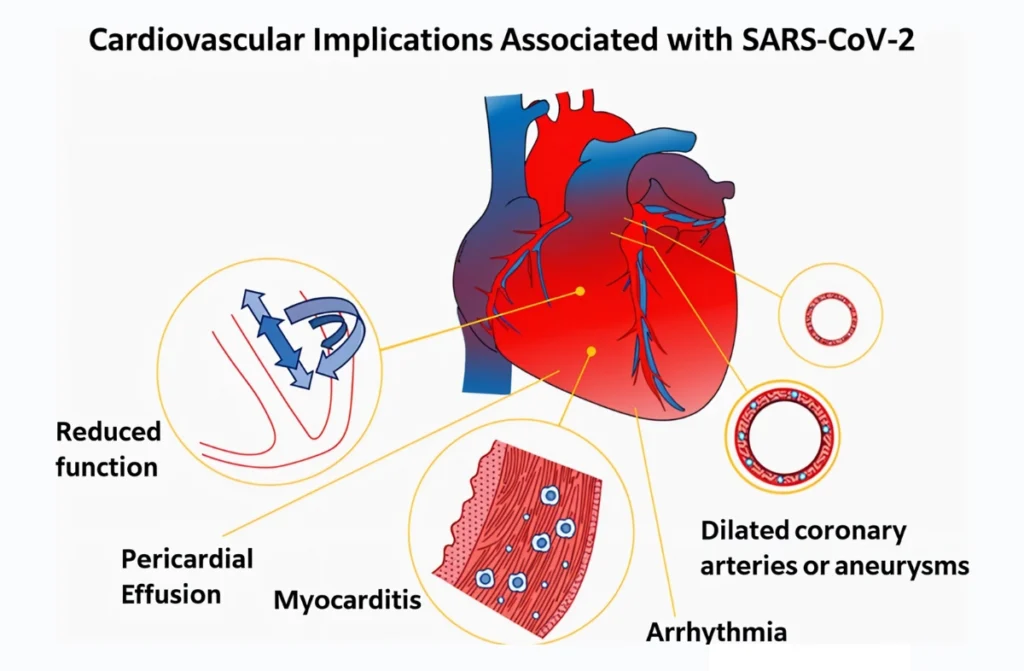The aftermath of a COVID-19 infection brings about a myriad of health considerations, with a growing concern being the impact on the cardiovascular system. Understanding and addressing the potential after COVID heart issues is crucial for comprehensive recovery. In this guide, we will delve into the intricacies of post-COVID cardiac concerns and provide insights on navigating this aspect of recovery.
Unraveling the Link Between COVID-19 and Heart Problems
The connection between COVID-19 and heart issues has become increasingly evident. The virus not only primarily targets the respiratory system but can also wreak havoc on the cardiovascular system. Individuals who have battled COVID-19 may experience lingering effects on their heart health, making it imperative to delve deeper into the realm of after COVID heart issues.
After Covid Heart Issues and Management Strategies
- Cardiac Evaluation: Undergo a thorough cardiac evaluation, including imaging tests like echocardiography and stress tests, to assess heart function after COVID heart issues.
- Medication Management: Follow prescribed medications meticulously, including those for blood pressure, cholesterol, and blood thinners if necessary after COVID heart issues.
- Lifestyle Modifications: Adopt heart-healthy habits, including a balanced diet, regular exercise, smoking cessation, and limited alcohol intake after COVID heart issues.
- Gradual Exercise: Engage in gradual and supervised exercise. Cardiac rehabilitation programs may be recommended for structured exercise plans after COVID heart issues.
- Monitor Symptoms: Be vigilant for symptoms such as chest pain, palpitations, or unexplained fatigue after COVID heart issues. Promptly report any concerning symptoms to healthcare providers.
- Mental Health Support: Address mental health concerns as they can impact overall well-being after COVID heart issues. Seek counseling or support groups if needed.
- Vaccination: Stay up-to-date on COVID-19 vaccinations, including booster shots after COVID heart issues. Vaccination contributes to preventing severe illness and complications.
- Regular Follow-ups: Maintain regular follow-up appointments with cardiologists and healthcare providers to monitor heart health after COVID heart issues.
- Holistic Approach: Consider holistic approaches such as stress-reducing activities, mindfulness, and adequate sleep to support overall recovery after COVID heart issues.
- Collaborative Care: Collaborate with a multidisciplinary healthcare team, including cardiologists, pulmonologists, and primary care physicians, for comprehensive care after COVID heart issues.

Understanding the Landscape of Post-COVID Cardiovascular Complications
The landscape of post-COVID cardiovascular complications has emerged as a critical aspect of understanding the long-term effects of the virus on individuals. As the medical community continues to delve into the complexities of COVID-19, it has become evident that the virus’s impact extends beyond the acute phase of the illness. One of the concerning areas of focus is the potential cardiovascular repercussions that individuals may face even after recovering from the initial infection.
Here are key aspects to consider in comprehending the landscape of post-COVID cardiovascular complications:
Inflammatory Responses and Myocarditis
One of the significant concerns regarding after COVID heart issues is the potential for inflammatory responses and myocarditis. The virus can trigger an immune system overreaction, leading to inflammation of the heart muscle. This condition, known as myocarditis, can weaken the heart and result in long-term complications if left unaddressed.
Blood Clotting and Cardiovascular Risk
COVID-19 has been associated with an increased risk of blood clotting, a factor that extends to the cardiovascular system. Post-recovery, individuals may face lingering issues related to blood clotting, elevating the risk of conditions like deep vein thrombosis or pulmonary embolism. Understanding and managing these risks are essential in the journey to recovery from after COVID heart issues.
Impact on Pre-existing Cardiovascular Conditions
For those with pre-existing cardiovascular conditions, COVID-19 can exacerbate the situation. The virus may intensify the symptoms and complications associated with heart problems, making it crucial for individuals with prior heart issues to receive specialized care and monitoring during the recovery phase from after COVID heart issues.
Long-Term Effects on Heart Function
The long-term effects of COVID-19 on heart function are still being studied, but emerging evidence suggests potential lasting impacts. Issues such as reduced heart muscle function, irregular heart rhythms, and persistent fatigue have been reported post-recovery. Monitoring and addressing these concerns are vital in ensuring a comprehensive recovery process.
Navigating Post-COVID Heart Health: A Holistic Approach
In the aftermath of a COVID-19 infection, individuals must pay special attention to their heart health due to potential complications and long-term effects on the cardiovascular system. Here’s a holistic guide to navigating post-COVID heart health:
Cardiovascular Rehabilitation Programs
Engaging in cardiovascular rehabilitation programs is a proactive step in mitigating after COVID heart issues. These programs, supervised by healthcare professionals, involve structured exercises, lifestyle modifications, and psychological support to promote overall heart health and recovery.
Regular Cardiovascular Monitoring
For individuals recovering from COVID-19, regular cardiovascular monitoring is paramount in addressing heart problems after COVID-19. This includes routine check-ups, heart function assessments, and screenings for potential complications. Timely identification of emerging issues allows for prompt intervention and management.
Lifestyle Modifications for Heart Health
Lifestyle modifications for heart health encompass adopting habits and choices that promote cardiovascular well-being. These adjustments typically involve maintaining a balanced diet rich in fruits, vegetables, whole grains, and lean proteins while limiting saturated fats, sodium, and processed sugars.
Regular physical activity tailored to individual abilities, stress management techniques like meditation or yoga, ensuring adequate sleep, and avoiding tobacco use are integral parts of these modifications. These changes aim to reduce the risk of heart disease, manage existing conditions, and support overall heart health, especially crucial in managing conditions stemming from health challenges such as those seen after COVID-19.
Psychological Support for Heart-Body Connection
Psychological support for the heart-body connection involves addressing the intricate relationship between mental health and cardiovascular well-being. It acknowledges that emotional stress, anxiety, or depression can significantly impact heart health. This support aims to enhance awareness of these connections and provide strategies to manage stress, cope with emotional challenges, and cultivate a positive mindset.
Techniques like mindfulness, counselling, or support groups can aid in reducing stress, improving overall mental health, and subsequently benefiting heart health during the recovery phase from health issues such as those arising after COVID-19.
Conclusion
In the journey of recovering from COVID-19, addressing heart problems after COVID-19 is a vital component. Understanding the potential cardiovascular complications, adopting proactive measures, and prioritizing heart health contribute to a more comprehensive and successful recovery.

